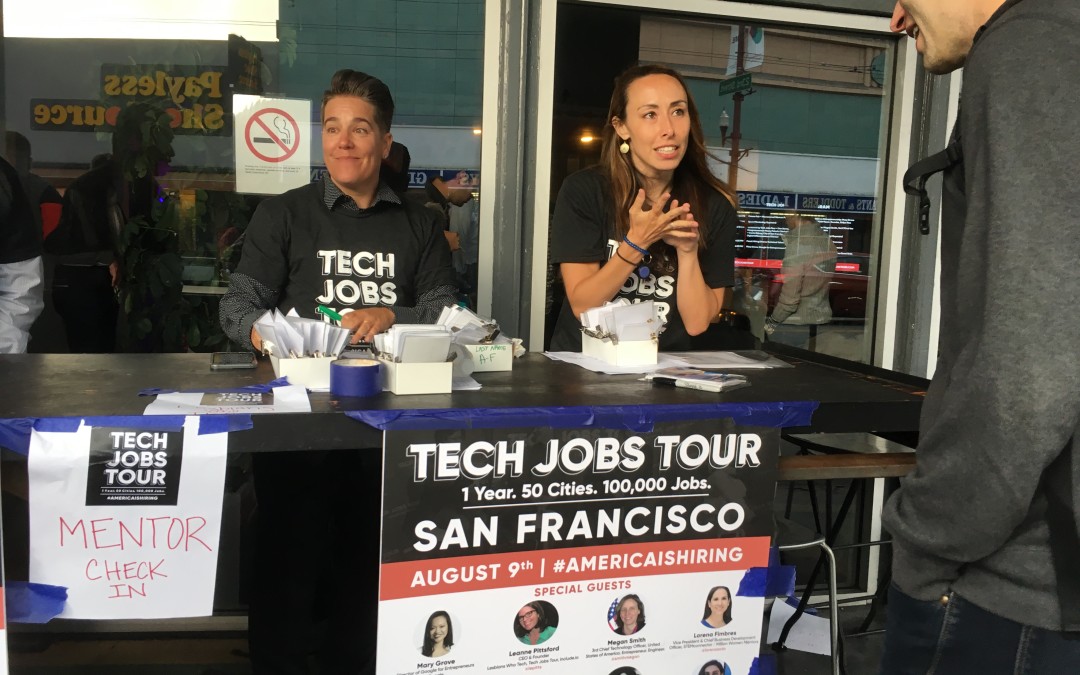
Tech Jobs Tour Hits San Francisco: BBC Report
It’s estimated that there are over half a million tech job openings in the United States. A new initiative, the Tech Jobs Tour aims to connect “non-traditional” talent with tech job opportunities. It targets women, people of color, LGBTQs, veterans and disabled workers. Alison van Diggelen attended the San Francisco stop, on assignment for the BBC World Service.
Photo caption: Michelle Skoor, Director of Programs, Lesbians Who Tech and Kirsten Lundgren, Director of Tech Talent at the Kapor Center for Social Impact check in participants at the Tech Jobs Tour stop in San Francisco
“This is a crisis. There are so many open jobs. We have to come together as a country and solve this problem. We’re bringing people together…making connections to the Googles and Amazons of the world,” Leanne Pittsford, Founder Lesbians Who Tech
“Let’s make it so people can really build their own creative confidences, so that we can field the whole American team, the whole world team,” Megan Smith, former CTO for the Obama Administration
The report aired August 29th on the BBC World Service program, Click
Listen to the BBC podcast at 21:00
Or to the segment below, which includes bonus material that didn’t make the final BBC cut: a provocative rap by cyber security student, Chris Brooks (starts @6:00).
Here’s a transcript of the segment and a longer version my report (including highlights from Chris Brooks’s rap):
BBC Click Host, Gareth Mitchell: There are half a million vacancies in technology in the United States, so lots of people re-skilling. To help that along is a Tech Jobs Tour. It’s part road show, part boot camp, part job center. Alison van Diggelen was taking part in one recently. The tour rolled into San Francisco…
[Event atmos fade in…]
On stage: Service designer, front end designer, UX designer, full stack developer…
Alison van Diggelen: This is the Tech Jobs Tour. Stop number 8 on a 50 city tour of the US. Its aim: to connect “non-traditional” talent with tech job opportunities. This national initiative target women, people of color, LGBTQs, veterans and disabled workers.
Chris Brooks is here with his brother Dontay. They’re doing a 6-month coding bootcamp at the Stride Center in Oakland. Their dream jobs? Cyber security…
Dontay: We saw the opportunity for school and we just ran with it. We seen this conference right here and it looked exciting. We want to network, get our names out there. You gotta show up to do anything!
Alison van Diggelen: Do you feel through tech you can make your life better?
Chris Brooks: Taking advantage of any opportunity, any avenue we can go down…Really, I’m just trying to get my foot in the door…
Alison van Diggelen: The brothers are part of an eclectic group of aspiring techies who queued up around the block for this rare chance to meet some tech movers and shakers. I spoke with an Air Force vet, ex-entertainers, burned-out math teachers, fashionistas and an unemployed retails workers.
Megan Smith, former CTO of President Obama’s White House is one of the keynote speakers tonight and a powerful advocate for diversity…
Megan Smith: It’s like a career fair meets kind of a revival…All around are people from this community desperate for talent. 2000 people signed up tonight…people are coming out, they want to understand. The businesses need this talent. Really, it’s an ecosystem lift.
Alison van Diggelen: The evening features onstage Q&A with diverse speakers, face time with reps from major tech companies via “speed mentoring” and lots of networking opportunities. Tech Jobs Tour founder, Leanne Pittsford, paints their mission in stark terms, describing the half a million unfilled tech jobs…
Leanne Pittsford: There’s talent everywhere. This is a crisis. There are so many open jobs. We have to come together as a country and solve this problem. We’re bringing people together…making connections to the Googles and Amazons of the world.
Megan Smith extends that message globally.
Megan Smith: Let’s make it so people can really build their own creative confidences, so that we can field the whole American team, the whole world team. People would opt in with the passion of what they want to solve…
Alison van Diggelen: Be that social justice, the environmental crisis, poverty, etc…As well as tech hubs like Silicon Valley, the Tech Jobs Tour is stopping at a regions hardest hit by tech disruption and job off-shoring including Tennessee, Kentucky, and Wisconsin.
Leanne Pittsford: We really need investment in the middle of the country in places that typically don’t get funding from Silicon Valley.
Pittsford is also a women’s rights activist and founder of Lesbians Who Tech, an advocacy group.
Leanne Pittsford: We believe in intentional inclusion…there’s no way to remove bias. We’re programmed to hire people like us…that feels less risky. We believe in quotas, setting goals: all of our speakers…50% women, 50% people of color. We urge companies to set the same type of quotas…goals.
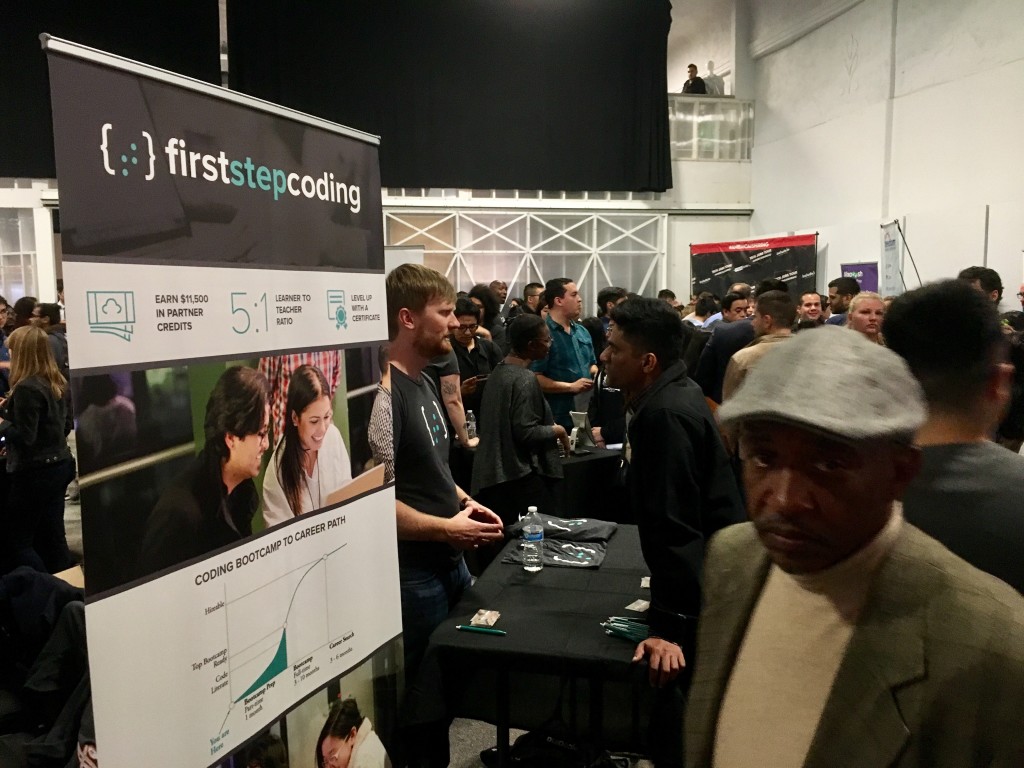
Photo caption: Stride Center instructor, Willie Lockett brought his class to the Tech Jobs Tour in SF. Photo by Alison van Diggelen, Fresh Dialogues
Alison van Diggelen: Pittsford says that about 60% of new technical people are getting their education* from short online courses and coding boot camps…a more affordable path for what she calls “non-traditional” talent. *It’s a trend highlighted this week by Hari Sreenivasan on the PBS Newshour
I chat with Audrey Zwibelman, one victim of tech disruption. A former apparel merchandiser at Macy’s, Gap and Levi’s. She’s doing what she describes as a mid-career pivot.
Audrey Zwibelman: My job moved to NY. It’s an industry that’s kind of dead or dying. The customer is shopping in a different way…
She’s bullish about training and job opportunities both here in Silicon Valley and across the world.
Audrey Zwibelman: No matter where you live, you can find those resources online. The remote accessibility that everyone has to be part of a company, means that people can work wherever they are. I think the opportunities are kinda limitless.
Leanne Pittsford sums up her goal for the Tech Jobs Tour…
Leanne Pittsford: Helping American innovation thrive… changing the face of tech and helping American innovation thrive. Diversity is better for your products, your team, and your bottom line. It affects all of us as an industry and as a country.
We have a community here today that is working really hard to change the landscape…trying to build a strong pipeline that represents the diversity of America…so if you’re hiring…
Alison van Diggelen: As yet, the model is unproven, but the team is traveling in hope.
Bonus Material
Here are highlights from Chris Brooks’s rap:
Chris Brooks: Climbing up a mountain
Young brother how come
Everybody’s dying by these guns?
I keep walking without one
Not trying to kill my brother
I’m trying to kill an album
Sell my story
Cos a good income’s a good outcome
Coming in due time
Millennials’ new minds
They tell them you look here
I tell you, you’re too blind
Just take a look around
My brother you’ll soon find
That the world is yours
Don’t let the hesitation haunt you…
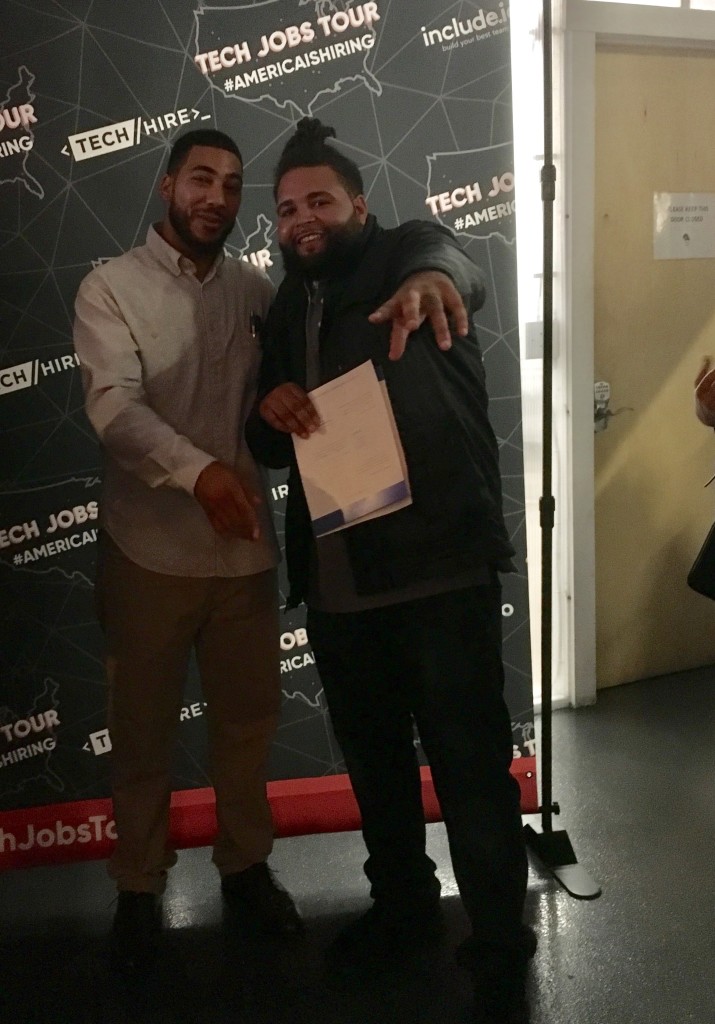
Photo caption: Chris Brooks and his brother Dontay. Both are cyber security students at the Stride Center in Oakland.
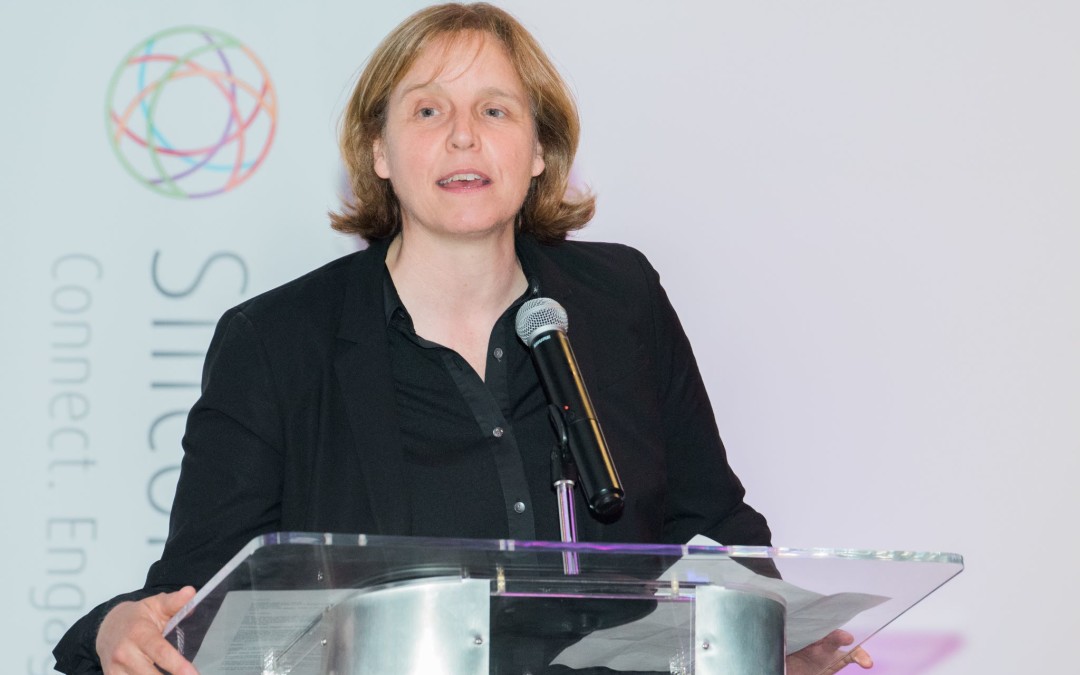
Wonder Women of Silicon Valley: Megan Smith, Ann Winblad, Neri Oxman & Linda Rottenberg
Some call it “The Oscars of Silicon Valley.” This year, the glitzy, red carpet affair celebrated four Wonder Women: Megan Smith, Ann Winblad, Neri Oxman and Linda Rottenberg. Alison van Diggelen reports on SVForum’s Visionary Awards for the BBC World Service. What are the secrets of these Wonder Womens’ success, and what do they think needs done to bring more women into the tech field?
Listen to the report and lively discussion with the BBC’s Fergus Nicoll. Our discussion starts at 26:00 in the podcast.
Here’s a transcript of our dialogue (edited for length and clarity):
Fergus Nicoll: Investigations reveal that women occupy only about 11% of Silicon Valley executive positions…and a tiny percentage of startups are owned by women. Are things going to change? Alison, you’ve been to an event to recognize talent in the sector…
Alison van Diggelen: Last week I attended Silicon Valley Forum’s Visionary Awards. SVForum is celebrating its 20th anniversary and unlike its usual male-dominated roster of honorees (Bill Gates, Vint Cerf, Elon Musk etc.), this year: three of its five honorees were female. I was curious to learn the secrets of their success, and what they think needs to be done to bring more women into the tech field. This is all in the context of Uber’s chief stepping down from the company this week – at least temporarily – and the company tacitly acknowledging that it needs to change what some are calling its toxic corporate culture for women. I was curious to learn the secrets of these Wonder Womens’ success, and what do they think needs to be done to bring more women into the tech field?
[Atmos: Crowd, music, welcome]
SVForum CEO, Denyse Cardozo: Good evening and welcome to the 20th anniversary Visionary Awards….
Alison van Diggelen: Just before she went onstage, I found tech pioneer Megan Smith surrounded by a group of adoring fans. She was President Obama’s Chief Technology Officer and now she’s back from DC her rockstar status is soaring among the technorati. You might even call her Silicon Valley’s Wonder Woman. Tall and forceful, she oozes enthusiasm and credits the valley’s unique ecosystem for her success.
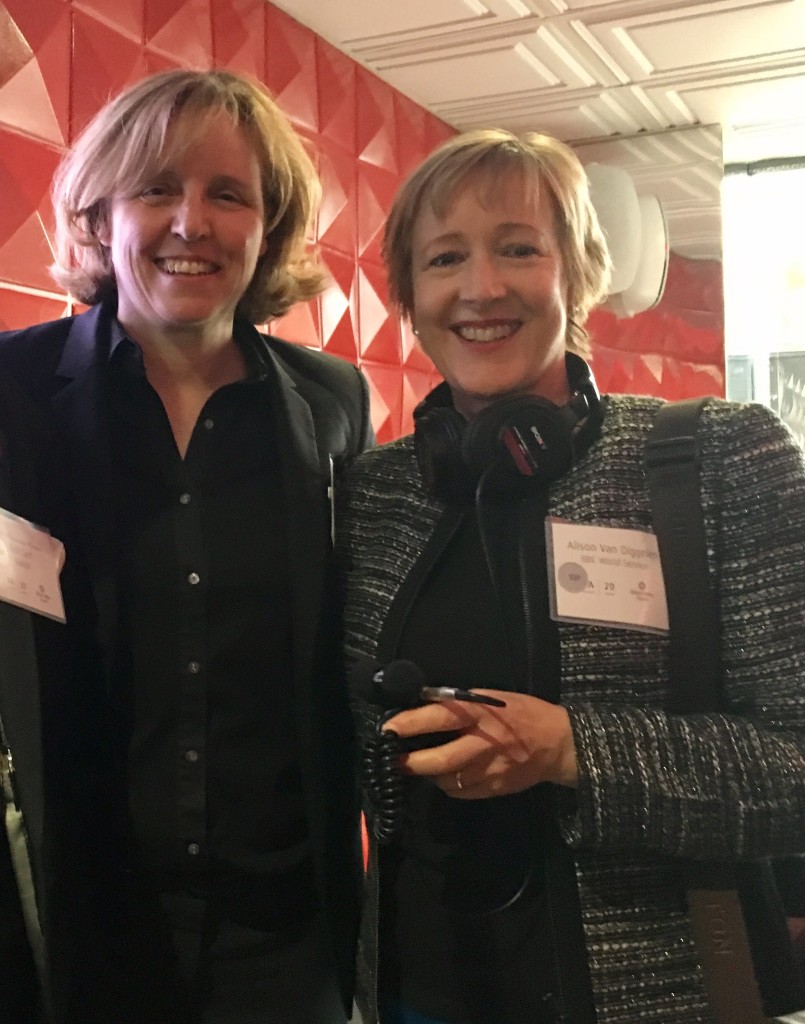 Megan Smith: One of the things I’m going to talk about tonight is this “apprentice- journeyman-master” and Silicon Valley is so good at that. We learn from those who have gone before. I was mentored here in this community by extraordinary people…
Megan Smith: One of the things I’m going to talk about tonight is this “apprentice- journeyman-master” and Silicon Valley is so good at that. We learn from those who have gone before. I was mentored here in this community by extraordinary people…
Alison van Diggelen: Notably, her list is all men. Women make up less than 15% of most tech companies’ technical teams. Why so few?
Megan Smith: We have this strange idea that there’s technical people and non-technical people and it’s a very un-useful cultural problem: stereotyping…The truth is women and men, people of color from every corner of the earth have been doing extraordinary, heroic and technical things and sometimes the stories get lost…
Alison van Diggelen: Smith blames story tellers for ignoring the significant contributions of women at Bletchley Park, at Apple and at NASA. Although she praises the recent “Hidden Figures” movie for finally highlighting the female heroes at NASA during the space race. Ann Winblad echoes the need to raise the profile of role models. She’s an influential venture capitalist in Silicon Valley and received her visionary award back in ‘99, alongside Bill Gates.
Ann Winblad: Women are not hidden figures in this industry. We’re honoring three really strong women tonight…….The more that we do things like these events where we show there are as many strong women to honor as strong men, it will enlighten women that there is a real opportunity.
Alison van Diggelen: Winblad reframes it in FOMO terms…Fear of missing out:
Ann Winblad: Six of the top ten highest valued companies in the world are tech companies…. We all know their names. For women they’re missing a huge opportunity if they don’t join the fastest growing, most exciting industry in the world.
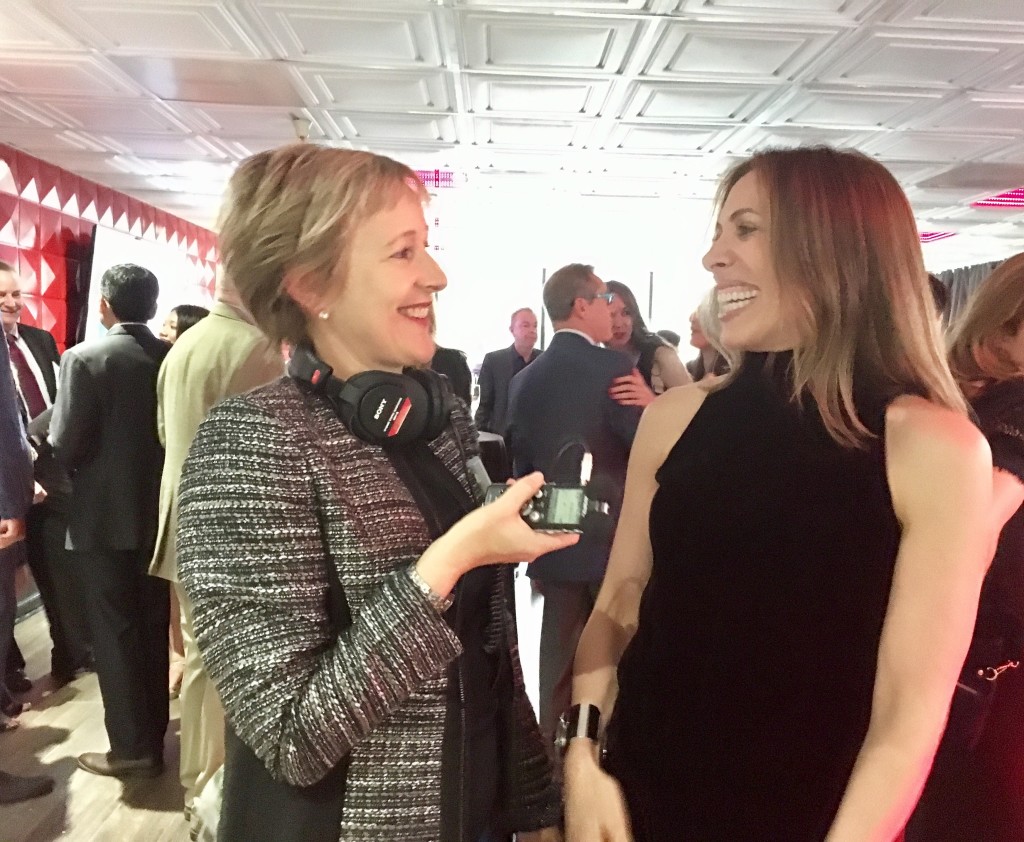
Alison van Diggelen: Linda Rottenberg knows about huge opportunities. Her visionary award is for pioneering Silicon Valley’s high-impact entrepreneurship model around the world. She challenges women to be braver and bolder; and to break stereotypes:
Linda Rottenberg: Not all innovators are boys in hoodies in their 20s: People are going to be over 50, people are going to be women…Sometimes our view of entrepreneurship gets so narrow cast that we dismiss the talent and creativity right in our midst. The biggest risk is taking none at all….
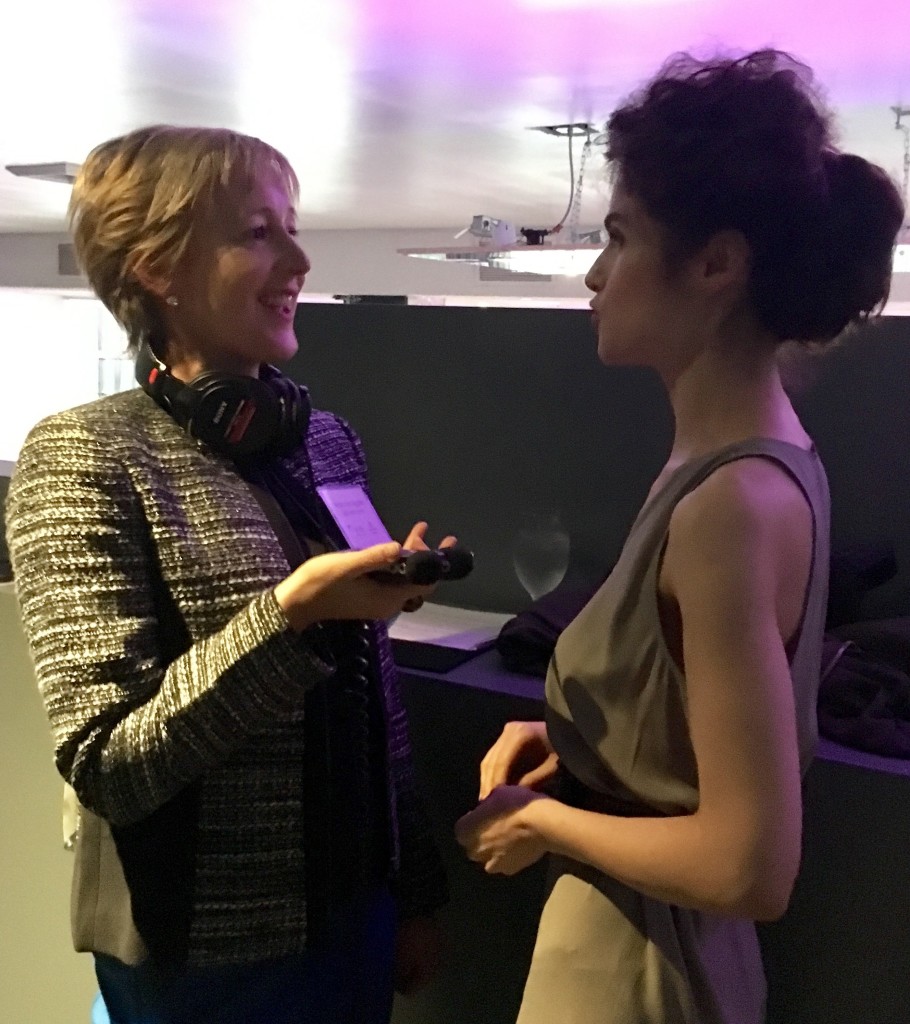
Alison van Diggelen: Fellow visionary, Neri Oxman believes in risk-taking and passion. She’s an inventor and designer at MIT’s Media Lab, famed for her “material ecology” innovations.
Neri Oxman: It’s not easy to define a new field and to generate new technologies for the kinds of project that we are creating, so it requires a suspense of disbelief; and a willingness to fail…
Alison van Diggelen: For her part, Megan Smith is passionate to launch a new tech startup soon to continue her White House mission. She believes that her computer science initiative will help empower many school kids. Here’s President Obama promoting the program back in January 2016…
President Obama: I’ve got a plan to help make sure all our kids get an opportunity to learn computer science, especially girls and minorities. It’s called Computer Science For All. And it means just what it says – giving every student in America an early start at learning the skills they’ll need to get ahead in the new economy…to make sure all our young people can compete in a high-tech, global economy.
Alison van Diggelen: Smith challenges tech leaders for not doing enough to make diversity a top priority:
Megan Smith: It’s really outrageous and irresponsible for the leadership in tech…and it’s also bad for the bottom line. Research shows the more diverse the team, the better financial performance…We’ve got to field the whole human team …it’s especially urgent right now with the beginnings of Artificial Intelligence and data science.
Alison van Diggelen: Celebrating these strong role models – these Wonder Women in Silicon Valley – is one thing, but boosting the pipeline of candidates is vital. Across the US, only 18% of computer science and engineering students are women. As the evening winds down and Silicon Valley’s glitterati disperse into the balmy San Jose evening, Ann Winblad throws down the gauntlet to the next generation:
Ann Winblad: I encourage young women to get excited about science and to make those computer science classes, those engineering classes at least 50% women. If it got higher than 50%, women would OWN the tech industry.
[Crowd, music…fade out] Report ends.
Continue listening to the discussion on BBC’s Business Matters podcast to hear our discussion and my BBC colleague Dave Lee’s report on Nintendo’s comeback.
This report also aired several times on the BBC’s World Business Report
The other visionary awards were presented to pioneering venture capitalist, Steve Jurvetson and Don Eigler, an award-winning nanoscientist.
See more photos of the Visionary Awards and watch video here.
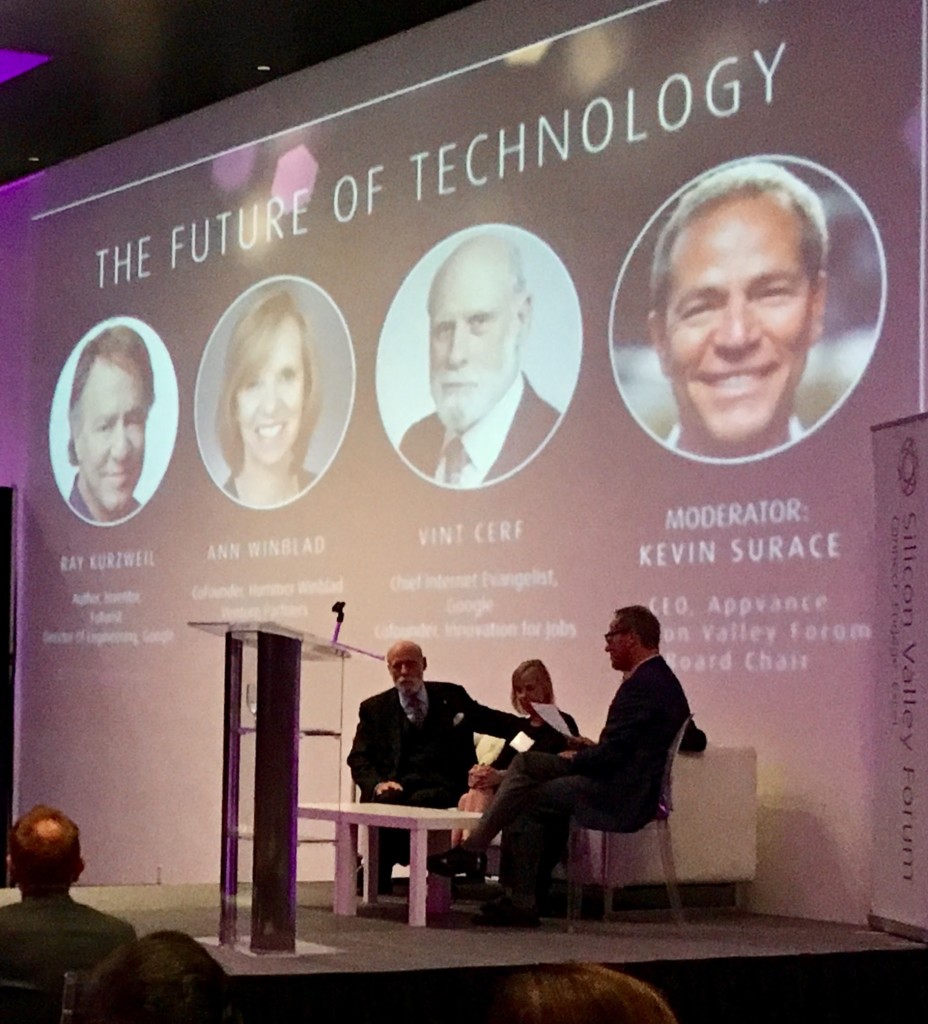
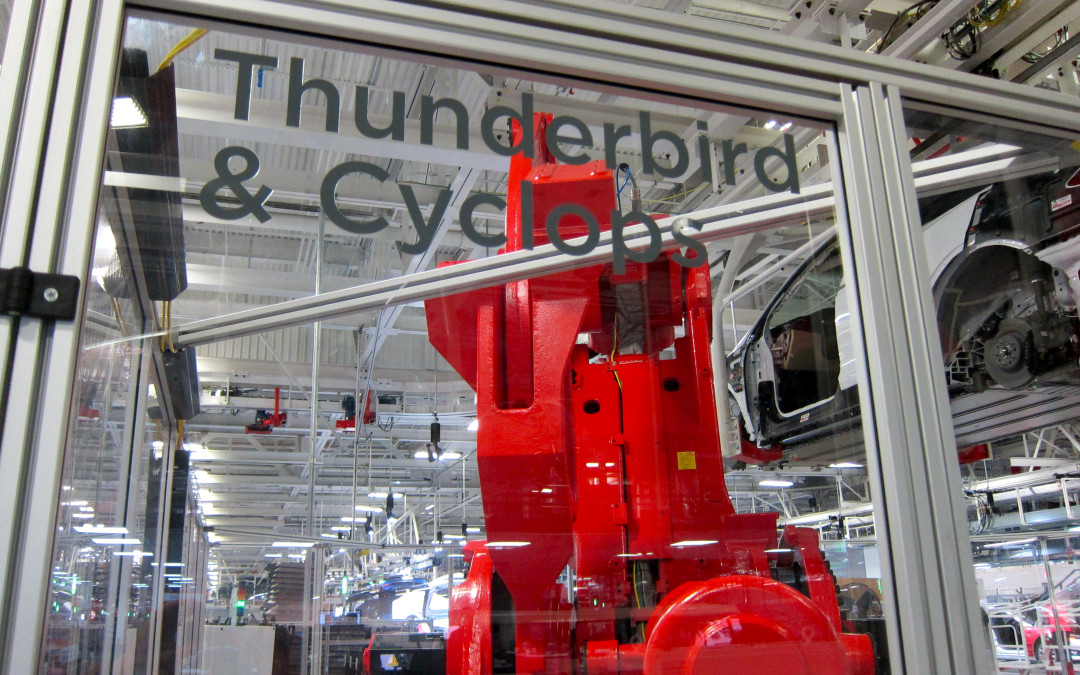
Elon Musk’s Ludicrous Plan for Tesla: BBC Dialogues
Elon Musk continues to make ambitious plans for Tesla Motors, some even call them “ludicrous.” Not content to make a niche product for electric vehicle enthusiasts, he now wants to conquer the mass market, competing in the major leagues against GM, BMW, Ford et al. Musk is promising an annual production of 1 million cars by 2020, a staggering increase from last year’s paltry: 76,000. Is he insane?
On a conference call with Musk and media colleagues this week, Alison van Diggelen, host of Fresh Dialogues learned that Musk is still calm and laser-focused on executing his “Tesla Master plan.” This year is crunch time for Tesla. The future of the company rests on the timely and efficient production of the Model 3, Tesla’s smaller, mass market car. Will demand stay strong, despite intense competition and reservation holders threatening to cancel due to his position on Trump’s economic advisory team? Musk seemed to flounder a bit on this question and refused to disclose the latest reservation numbers, for fear of analysts “reading too much into them.”
During the discussion of Tesla’s 2016 financial results, some anomalies arose. Despite continuing to make massive losses (due to capital investment in the Tesla Factory and the Gigafactories), its share price is still in the stratosphere. Tesla might produce a small fraction of GM and Ford’s output, but the company is valued on par with them. What gives?
“The recent run-up in Tesla stock has less to do, in our view, with anything around the near-term financials, and more to do with the nearly superhero status of Elon Musk,” Barclays analyst, Brian Johnson.
Superhero status? More ludicrousness…The superheroes Tesla is focused on are the mighty robots on the factory floor. Musk has named them after X-men superheroes, like Cyclops and Thunderbird (see photo above); and they’re the ones that’ll have to earn their superhero status as manufacturing goes into top gear in the next few month.
“Tesla is going to be hell-bent on becoming the best manufacturer on earth.” Elon Musk
The BBC’s Fergus Nicoll invited me on Business Matters to help explain more.
Listen to the full podcast on BBC World Service (starts at 37:30) or the 5 minute clip below:
Here’s a transcript of our conversation (edited for length and clarity):
BBC Host, Fergus Nicoll: Tesla stock has hit record highs, soaring 50% since December. With investor confidence growing that Tesla will deliver its Model 3 on time. Let’s explore this with Alison in Silicon Valley. Before we get into the nitty gritty of Model 3, and the other numbers, I know you watched Elon Musk do the webcast that go with the Q4 figures. What kind of presentation did he come up with?
Alison van Diggelen: I listened to the (live conference call) podcast. Elon Musk was on the podcast with his (retiring) CFO, answering questions from the media. They were generally upbeat. Elon Musk always over-promises how soon his vehicles will be delivered, but he is confident that they’re going to start deliveries of their Model 3 in July of this year, for employees first…beta testing for employees. He’s hoping for the mass rollout starting in September of this year. They’re pretty bullish about that.
Fergus Nicoll: Here’s the thing: Tesla has a valuation pretty close to Ford. But compared to Ford it makes about five cars! So what are we seeing? A massive future priced into that?
Alison van Diggelen: That’s right. Last year, Tesla delivered 76,000 vehicles (compared to Ford’s 2.5 million), but Elon Musk is very bullish. He’s aiming for the factory to produce 500,000 cars by the end of 2018, and one million a year by 2020. He’s ludicrously ambitious. Brian Johnson, who’s an analyst with Barclays, called this run up in the Tesla stock more “Elon Musk superhero status” than short term financials. What Elon Musk says, he often delivers….eventually.
Tesla merged with SolarCity, the rooftop solar provider, so that is also giving an upside. They’ll be able to cut costs: Tesla showrooms will also become showrooms for the SolarCity solar panels. They’re also doing the other side of the equation: energy storage….
Fergus Nicoll: The household and business batteries.
Alison van Diggelen: Exactly.
Fergus Nicoll: The thing is, Americans drive insane distances. Electric cars have to go a long way….the infrastructure has to catch up with the company?
Continue listening to the podcast clip above, or at BBC Business Matters for more about:
The ambitious supercharger network expansion
The fact that all cars will be equipped to be fully self-driving
Why the market continues to bet on Elon Musk
***
For Tesla to succeed in becoming “the best manufacturer on earth,” three big questions remain:
- Will the Tesla Model 3 be delivered on time and on budget this year?
- Will demand stay strong for Tesla, despite stiff competition from GM, Ford, BMW, Nissan, etc?
- Can Tesla make the huge capital investment required (for the Tesla Factory and Gigafactories expansion), without running out of money?
Read more about Tesla and Elon Musk from Fresh Dialogues archives
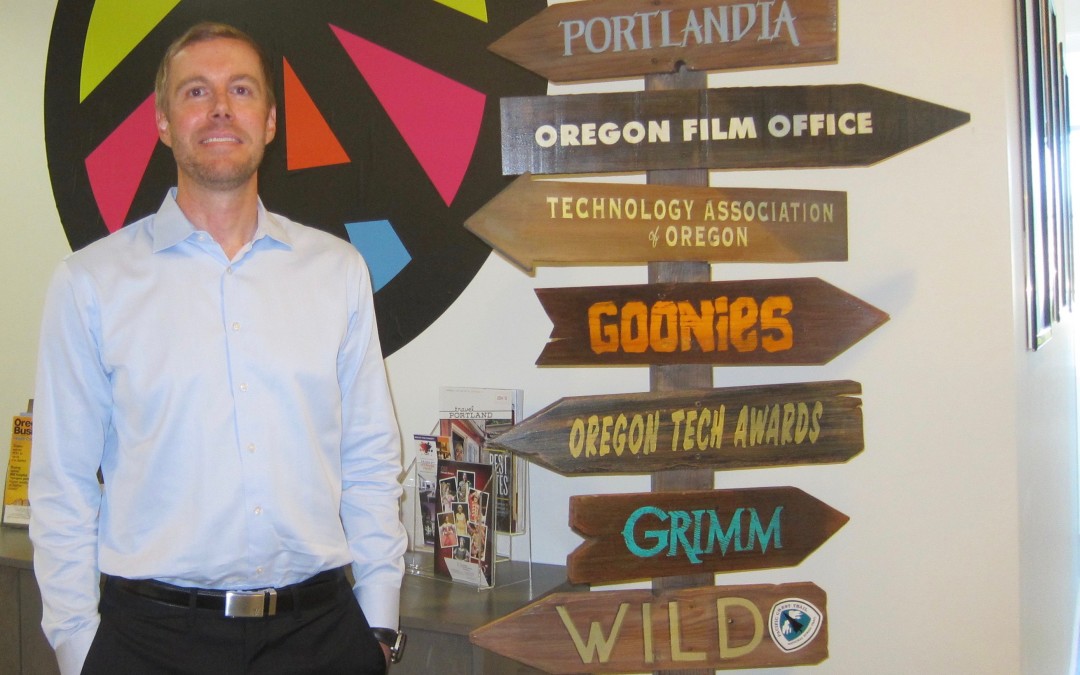
BBC Report: What Can Tech Hubs, Silicon Valley learn From Portland?
By Alison van Diggelen, host of Fresh Dialogues
I recently attended Silicon Valley’s Tech Awards, and despite the inspiring innovators from around the world, there was an underlying mood of disquiet (even alarm) as Silicon Valley adjusts to the imminent reality of a Donald Trump presidency. I asked Tim Ritchie, President of the Tech Museum, what his predictions are for Silicon Valley under a new administration whose leader who has frequently espoused anti-science rhetoric. Here’s his response:
“We need to become a community that values science, that trusts evidence, that’s not afraid of facts, that’s not afraid of the future. My hope is that people will say: we’re Americans, we do not fear the future; we believe we can solve problems. And so hopefully it’ll be a wakeup call to be who the world needs us to be.” Tim Ritchie, President of the Tech Museum of Innovation, and host of the Tech Awards.
Of course, Silicon Valley is not afraid of the future and is full of risk-taking innovators, but as Ritchie says, it has received a wakeup call, and a stark reminder of the political bubble it lives in. There is a thriving tech world beyond Silicon Valley and its sky-high cost of living, traffic congestion and their impact on our quality of life are forcing some residents and companies to look elsewhere.
Portland, Oregon attracted Intel back in the 1970’s and more recently, tech companies like Google, AirBnB, Salesforce, and eBay have moved some facilities to the Portland area. Today Portland is a hub for global sportswear companies and has a growing tech startup scene. I went there to investigate what Silicon Valley and other global tech hubs can learn from its success and filed this report for the BBC World Service program, Business Matters.
Listen to the podcast at BBC Business Matters (The show is titled: How will Castro’s Death Affect Cuba-US Relations?) The Portland segment starts at 29:00.
Listen to the Portland segment here:
Here’s an excerpt of Tuesday’s program and my original report transcript (edited for length and clarity):
BBC host, Fergus Nicoll: Move over Silicon Valley. Today, we take you up to Silicon Forest, zooming up the west coast to Portland, Oregon and its thriving tech scene. A growing number of companies have made that move north. So what are the ingredients that make it a fertile ecosystem for tech startups and what can other tech hubs learn? Over to Alison…
Alison van Diggelen: Thanks Fergus. I took the 90 minute flight north of Silicon Valley to Portland (aka Silicon Forest). It does have a thriving tech scene and I wondered if Silicon Valley has anything to fear from this growing startup scene. I met with Jonathan Evans, a Blackhawk pilot who’s now CEO of Skyward, a drone management startup. Here’s what he said:
Jonathan Evans: If you haven’t been to Portland, you have to come, it’s one of the most magnificent cities on earth. It’s a beautiful, culturally rich city, an urban patchwork of villages, pedestrian scaled and we sit right at the foot of the Cascade mountains and just inland of the Pacific Ocean. This culture is wonderful at supporting innovation, technology and big bold ideas…This is a pioneering place. We’re anchored by Intel’s largest campus here. Intel, the Moore’s-law-driving-machine that’s producing all the chips and there’s a whole constellation of hardware companies that have come out of that ecosystem.
Alison van Diggelen: Although Evans visits Silicon Valley twice a month to meet with clients and investors, he’s not tempted to relocate his business.
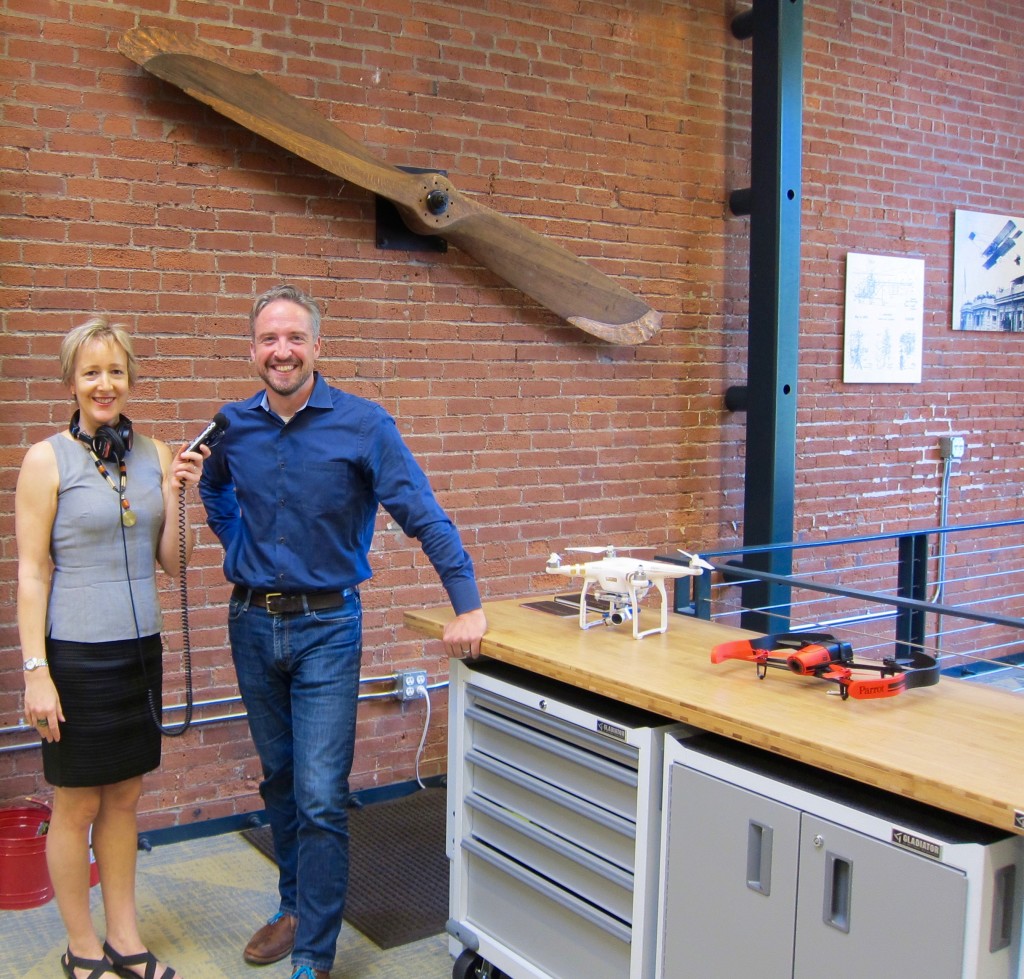
Jonathan Evans: I don’t think there’s ever a part of me that wants to stay…(laughter) It’s a personal choice….We live well. If you look at it tenaciously as a business man: it’s half to one-third the cost living here and that translates to the salaries that we have to pay and the rent we have to pay…everything that comes into building a lean venture-backed tech startup really comes to apply here nicely…It’s a very legitimate place to grow a company, and to be backed by San Francisco and Silicon Valley.
Alison van Diggelen: And that cheaper “cost of doing business” has caught the attention of high-priced, highly congested Silicon Valley. Tech companies like Google, AirBnB, Salesforce, and eBay have already moved some facilities to the Portland area. They tend, however to be the support and “backend” part of today’s tech ecosystem.
Polysync, a software startup in the autonomous driving sector recently relocated to Portland, from Idaho. I spoke with the CEO, Josh Hartung. Why did he choose Portland and not Silicon Valley?
Josh Hartung: Silicon Valley is always at the cutting edge, you have the best people in the world, hyper-new type stuff, where you’re seeing machine learning and autonomous driving really being pushed. For us, that wasn’t so important…We’re infrastructure builders, we want people who’re good at the plumbing… we want solid engineers that build backend.
Alison van Diggelen: For a big picture view, I crossed the river to talk with Skip Newberry, the President of the Technology Association of Oregon (pictured at top).
Skip Newberry: We’re still relatively immature… as a true technology hub. We don’t have the deep bench that exists in a place like Silicon Valley.
Alison van Diggelen: And yet, he’s bullish about Portland’s growth potential. A recent report showed that Portland’s tech talent pool grew 28% from 2010 to 2013, even faster than Silicon Valley’s (in percentage terms). Newberry says a focus on talent, access to capital and the regulatory environment is helping. He’s convinced that public-private partnerships in education and the “Internet of Things” will help create the right ecosystem for startups. He cites projects to improve air quality and transportation.
Skip Newberry: One area that we’ve been really active in has been “Smart Cities”– leveraging Portland’s reputation internationally as a global hub for urban planning and transportation systems. We’ve been trying to focus on the biggest challenges cities face, because if we can solve those, it’s something that will allow us to remain competitive in attracting top tech talent, because our quality of life will continue to be good. We’ve got a network of cities around US and globally who’re doing the same thing.
Alison van Diggelen: So does Silicon Valley have anything to fear from Portland? Not for now. Silicon Valley has more established tech hubs like Boston and Austin; New York, and Seattle to worry about. In any case, it’s too busy forging ahead, “inventing the future” with artificial intelligence, autonomous driving, drones and who knows what else?
Fergus Nicoll: Nice piece, Alison. Thanks. That was Skip Newberry, one of the people that believes Portland has the vision and I guess there has got to be an environment that fosters this: state authorities, maybe federal interest in making sure the good news is spread across the states…not just Silicon Valley?
Alison van Diggelen: Absolutely. I think the ecosystem of Silicon Valley is second to none and that was something that I came across when I talked with startup founders in Portland. There isn’t that deep bench of experienced people, the venture capital…
Fergus Nicoll: Explain that phrase “deep bench.”
Alison van Diggelen: I think it’s a baseball term. It means experienced business people: angel investors, venture capitalists, people who have started companies and have scaled them up: from a startup to the size of Facebook, Google etc. Portland is a relatively young tech hub and so they’re still establishing that talent base. What Silicon Valley has is a self perpetuating cycle: you’ve got the innovators, the risk-takers, the early adopters and it all reinforces. There’s a cycle going on: the people who’re successful become angel investors, venture capitalists…they’re all focused on Silicon Valley, because they’re here in Silicon Valley. Despite our connected world, doing business with eye to eye contact is still important.
Fergus Nicoll: Parag Khanna, is there endless room for such hubs or should it be focused?
Parag Khanna: It was a great piece. I have been to Portland and the geography does matter as well as the cost of living. It’s very close to the Vancouver/Seattle corridor, a wealthy, high quality infrastructure, diversified businesses, also a lot of talent spilling over from there and obviously sales opportunities for Portland based companies. And as the story reflected: talent spilling over from Silicon Valley. The geography is wonderful for this and people can live in between these two great, very deep bench economic zones and yet have a very high quality of life and affordable cost of living.
Continue listening to the podcast for these discussions:
Tech Clusters in Asia: Parag Khanna offers some excellent insights.
Smart Cities
A “Masterclass” in public speaking (featuring the fearless Lucy Kellaway of the Financial Times)
The future of Cuba/US relations, post Fidel Castro: I’m predicting the business opportunity will be irresistible for President Trump and we’ll soon see a tech hub in Havana, as well as a brand new Trump tower.
To explore other interviews and reports for the BBC, check out the BBC Archives at Fresh Dialogues.
NB: This report and other BBC Reports and BBC Dialogues at Fresh Dialogues are shown here for demonstration purposes. The copyright of this radio report remains with the BBC.



